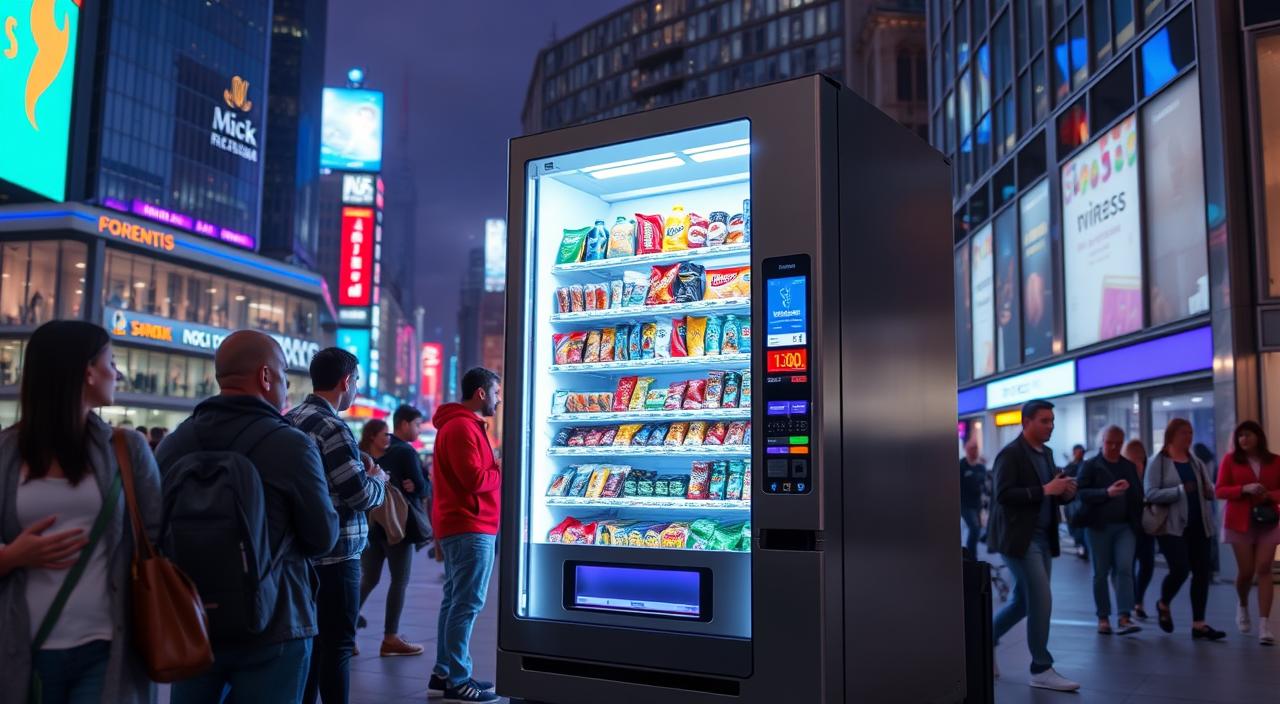The vending machine industry in the U.S. made over $8.6 billion in 2023. This makes it a great choice for both new and seasoned entrepreneurs. You can start a basic vending machine business with just $2,000.
If you’re looking into vending machine business for sale, or want to know about profits, this guide is for you. It will help you start a successful vending machine business.
Key Takeaways
- The vending machine industry in the U.S. generated over $8.6 billion in annual revenue in 2023.
- Starting a vending machine business can require an initial investment of $50 to $10,000, depending on the type of machines.
- Buying used or refurbished vending machines can be a cost-effective option, costing between $1,200 and $3,000.
- Vending machine operators typically pay property owners 5% to 25% of the revenue as a commission.
- Choosing the right location is key for a successful vending machine business.
Vending Machine Industry Overview
The vending machine industry is booming in the United States. It’s a great chance for new entrepreneurs. The global vending machine market size was $21.3 billion in 2020. It’s expected to hit $31 billion by 2027, growing 5.5% each year.
In the U.S., the vending machine industry is worth $5.8 billion. It’s growing at 8.9% each year. This shows the industry’s strength and the public’s love for easy access to products.
The vending machine revenue has kept growing, even with COVID-19. This shows the industry’s strength and the public’s need for easy access to products. The market is growing at 16.7% each year, making it a great time to start a vending machine business.
Market Size and Revenue
The vending machine industry is mostly made up of small, independent operators. No single company has more than 5% of the market. This means there’s a big chance for new entrepreneurs to make their mark.
A well-placed vending machine can make $35 a week. It can make 50% to 86% profit on items like bottled water. With smart strategies, like negotiating better deals and using used machines, you can make more money.
“The vending machine industry is a thriving and lucrative market in the United States, showing great promise for new entrepreneurs.”
The vending machine market is expected to keep growing. It could be worth $37.2 billion by 2032. This shows the industry’s strength and the ongoing demand for easy access to products.
Benefits of Starting a Vending Machine Business
Starting a vending machine business has many perks for new entrepreneurs. One big plus is the low start-up costs. You can finance vending machines and only need a few basic items like a computer and phone.
Vending machines cost between $1,000 for used ones and $5,000 for new ones. Specialty machines can range from $3,000 to $10,000.
Business owners can also set their own hours. They can restock and collect money at their convenience. This flexibility helps them balance work and life better. Plus, they can quickly update their products to keep customers happy.
- Low startup costs, with initial investments often less than $5,000
- Flexible scheduling, allowing owners to manage the business on their own time
- Ability to easily change product selection to meet customer preferences
- Controlled growth opportunities, from single machines to a fleet
- Overall simplicity of the business model compared to other ventures
The vending machine business is a great choice for entrepreneurs. It’s low-risk, scalable, and easy to manage. With the right location and products, it can bring in steady income and grow over time.
“Starting a vending machine business allows for a high-profit margin with a minimal upfront investment. The flexibility and scalability of this business model make it an appealing choice for aspiring entrepreneurs.”
How to Start a Vending Machine Business
Business Structure and Licensing
To start a vending machine business, you need a solid legal setup and the right licenses. Setting up as an LLC or corporation helps you grow, look credible, and manage money well.
You’ll also need specific permits to run vending machines in your area. This includes health department licenses, sales tax permits, and any special certifications. Knowing the laws in your state and local area is key to avoid legal issues.
- Establish a legal business entity (e.g., LLC, corporation)
- Obtain necessary licenses and permits for vending machine operations
- Familiarize yourself with local regulations and industry-specific requirements
With the right business setup and licenses, you’re ready to start a how to start a vending machine business. You can then focus on getting equipment, picking products, and finding great spots for your vending machine business.
Product Selection and Vending Machine Types
Starting a vending machine business means picking the right products and machines. Food and beverage vending is the biggest part, meeting the need for quick snacks and drinks. Bulk vending machines are cheaper, filled with items like gumballs and toys. Specialty vending machines offer a variety of products, from hot drinks to laundry supplies.
Food and Beverage Vending
Food and beverage machines are key in the industry. They have snacks, soda, and candy for many people. Where you place these machines matters a lot.
Bulk Vending
Bulk vending machines are easy to start with. They have fun items like gumballs and toys. They don’t cost much to start or keep up, but they might not make as much money.
Specialty Vending
Specialty machines offer unique items, like hot drinks and laundry supplies. They meet specific needs, helping your business stand out.
| Vending Machine Type | Product Examples | Revenue Potentail | Maintenance Requirements |
|---|---|---|---|
| Food and Beverage | Snacks, Soda, Candy | High | Moderate |
| Bulk | Gumballs, Toys, Stickers | Low to Moderate | Low |
| Specialty | Hot Beverages, Retail Goods, Laundry Supplies | Moderate to High | Moderate to High |
Picking the right vending machines and products depends on your market and locations. Look at demographics, foot traffic, and competition. This helps you offer something valuable to your customers and succeed in your business.
How to Start a Vending Machine Business
Starting a vending machine business requires several steps. First, you need to decide what steps to start a vending machine business you want to sell. Then, choose the right vending machine types. Next, find the best places to put your machines, making sure they’re in busy areas that match your target market.
You’ll also need to get the right business licenses and permits. You must also set up contracts with property owners for your vending machine spots. Buying or leasing the machines, stocking them, and planning for maintenance are key steps to a successful steps to start a vending machine business.
- Determine the products and vending machine types you want to offer.
- Identify high-traffic locations that align with your target audience.
- Obtain the necessary business licenses and permits.
- Establish contracts with property owners for vending machine placement.
- Acquire the vending machines, either through purchase or lease.
- Stock the machines with your selected products.
- Implement a plan for regularly maintaining and servicing the machines.
The global steps to start a vending machine business market was worth $21.3 billion in 2020. It’s expected to hit $31 billion by 2027, growing at 5.5% annually. In the U.S., the market is $5.8 billion and growing at 8.9% each year. By following these steps, you can start a thriving steps to start a vending machine business and benefit from the industry’s growth.
“The vending machine industry offers an attractive opportunity for entrepreneurs looking to start a reliable, passive income stream.”
| Vending Machine Industry Metrics | Value |
|---|---|
| Global Market Size (2020) | $21.3 billion |
| Global Market Size (2027 Projected) | $31 billion |
| Global Growth Rate | 5.5% |
| U.S. Market Size | $5.8 billion |
| U.S. Growth Rate | 8.9% |
Finding the Right Vending Machine Locations
Choosing the right spots for your vending machines is key to success. The right spot can boost your profits. Think about foot traffic, who might use the machines, and how easy it is to get there.
- AutoZone Business Account: Fleet Services & Savings
- Grow Your Business with Shopnaclo – Smart Solutions
Ideal Locations for Vending Machines
Look for busy places where people often need snacks or drinks. Great spots include:
- Schools and colleges
- Hospitals and medical facilities
- Offices and workplaces
- Shopping malls and retail centers
- Airports and transportation hubs
- Laundromats and recreational facilities
Get in touch with property owners or managers to place your vending machine locations. Make sure to follow local laws and rules.
To succeed, dress well, offer healthy options, and match your machines to the location’s needs. Building relationships and being good at sales helps too. This way, you can find the best places for vending machines.
If you can’t find good spots on your own, think about hiring a vending locator. They can find great places and get good deals for you.
Success in vending comes from smart placement. Choose busy spots and meet your customers’ needs. This way, you can make a steady income.
| Location | Potential Monthly Revenue |
|---|---|
| High-traffic area | Up to $2,000 |
| Low-traffic area | As low as $50 |
To make money, pick spots with lots of people. Apartments, motels, and college dorms are great because they’re busy and people need what you offer.
“The location of your vending machine is a key factor in making a profit. Look for busy places where people often need snacks, drinks, or other items.”
Purchasing or Leasing Vending Machines
Starting a vending machine business gives you choices. You can buy new or used machines. New ones cost between $3,000 and $10,000. Used or refurbished machines start at $1,200 to $3,000. Leasing machines is another option, which lowers the initial cost.
New vs. Used Machines
Choosing between new and used machines depends on several factors. Look at the machine’s features, reliability, and upkeep needs. Also, think about your budget. New machines have the latest tech but cost more. Used machines are cheaper but need careful inspection.
Leasing Options
Leasing vending machines is good for those with less money upfront. Leases often include maintenance and repair, saving you money. They also let you upgrade or replace machines as your business grows.
| Vending Machine Type | New Machine Cost | Used Machine Cost | Leasing Options |
|---|---|---|---|
| Snack and Drink Combo | $5,500 | $2,000 – $3,500 | Typical lease term of 3-5 years |
| Bulk Vending | $500 – $1,500 | $50 – $500 | Shorter lease terms available |
| Specialty Vending | $3,000 – $10,000 | $1,200 – $3,000 | Flexible lease options |
The choice between buying, leasing, or using used machines depends on your budget and goals. Carefully consider your options to find the right fit for your buying vending machines, leasing vending machines, or used vending machines needs.
Stocking and Maintaining Your Vending Machines
Running a successful vending machine business needs good vending machine product sourcing and inventory management. Finding reliable wholesale suppliers can help you get the best prices. This is key for stocking your machines.
It’s important to keep an eye on your inventory and sales. This ensures you have the right items for your customers. It also helps avoid losing money due to stockouts or machine problems. Regular upkeep, like cleaning and restocking, keeps your machines running well.
Product Sourcing and Inventory Management
For vending machine product sourcing, compare different wholesale suppliers. Look for those with good prices, reliable delivery, and flexible orders. This helps you meet your needs.
- Work with several suppliers to avoid supply chain issues.
- Keep up with trends to offer what customers want.
- Use a good vending machine inventory management system to track sales and stock.
- Use data to improve your product selection and restocking.
Keeping your vending machines in good shape is also vital. Regular checks and services prevent mechanical problems. This ensures your machines work well and customers are happy. Keep them clean, restock quickly, and fix issues fast.
| Key Considerations for Vending Machine Product Sourcing and Inventory Management |
|---|
|
By focusing on smart vending machine product sourcing and inventory management, you can make your vending machine business more profitable and efficient.
Marketing and Growing Your Vending Machine Business
To grow your vending machine business, focus on building strong relationships with property owners and managers. Networking, cold-calling, and attending local events can open new opportunities. Also, offer discounts or partner with local businesses to boost sales.
As your business grows, add more machines and explore new areas. This strategy taps into new markets and diversifies your income. The vending machine business is great for entrepreneurs because it has low startup costs and flexible hours.
For more growth, create a strong marketing strategy. Use social media, email, and SEO to reach more people. Good content and ads can help you grow your brand and attract new clients.
Stay updated on industry trends and improve your products to stay competitive. By adapting to new trends and using innovative technologies, your business can thrive in the future.
| Vending Machine Costs | Inventory Costs | Property Owner Fees | Profit Potencial |
|---|---|---|---|
| $2,000 – $10,000+ | $100 – $3,000+ | 5% – 25% of sales | $1,000 – $5,000+ annually |
“Vending machines can be a lucrative and flexible business opportunity for entrepreneurs looking to diversify their income streams.”
Legal and Financial Considerations
Starting a vending machine business requires careful attention to legal and financial matters. It’s important to follow regulations to avoid legal problems and ensure smooth operations.
Regulations and Compliance
Understanding state and local laws is key when starting a vending machine business. You’ll need to get the right licenses and permits. This includes a business license, sales tax permit, and any vending machine-specific licenses.
Keeping up with these rules is vital. It helps you avoid fines and legal trouble.
Financing Options
Finding the right funding is essential for your vending machine business. You might use personal savings, small business loans, business credit cards, or investors. Each option has its pros and cons.
- Personal savings or investments
- Small business loans from banks or online lenders
- Business credit cards
- Partnering with investors or seeking venture capital
- Crowdfunding platforms
It’s important to research and compare these options. This way, you can choose the best one for your vending machine business.
By focusing on the legal and financial aspects, you can build a strong foundation for your vending machine business. Following the rules and getting the right funding will help you succeed. It will also set your business up for growth and profit.
Conclusion
Starting a vending machine business can be both profitable and easy for new entrepreneurs. By picking the right products and locations, you can make a good income. The demand for snacks and drinks is high, making this a great opportunity.
The vending machine market is expected to grow to over $30 billion by 2027. In the US, sales from vending machines could reach $8 billion. Soda machines are big sellers, and specialty machines are gaining fans. Getting the right machines and finding good spots are key to success.
There are many ways to fund your vending machine business. You can get loans or leasing deals. Knowing the latest trends and rules can help your business grow. This way, you can make the most of the demand for easy-to-get products.
FAQ
What is the size and revenue of the vending machine industry in the US?
In 2023, the vending machine industry in the U.S. made over $8.6 billion. The global market was valued at $21.3 billion in 2020. It’s expected to hit $31 billion by 2027. The U.S. market is estimated at $5.8 billion, growing at 8.9%.
What are the key benefits of starting a vending machine business?
Starting a vending machine business has many perks. It has low startup costs and lets you set your own hours. You can easily change what you sell and control how fast you grow. Plus, it’s simple to manage.
There’s no need for much extra equipment. You can finance your machines and use a computer, printer, and phone to run the business.
What are the legal requirements for starting a vending machine business?
To start, you need to form a legal business entity like an LLC or corporation. You’ll also need the right licenses and permits for your area. Think about how you’ll pay for your machines and inventory too.
What types of vending machines and products can I offer?
There are several types of vending machines. Food and beverage machines sell snacks, soda, and candy. Bulk vending machines have items like gumballs and stickers.
Specialty vending machines offer a wide range of products, from hot drinks to laundry supplies and tobacco.
How do I choose the right locations for my vending machines?
Choosing the right spots is key to making money. Look for places with lots of people, like schools, hospitals, and malls. Reach out to property owners to place your machines.
Should I buy new or used vending machines?
You can buy new or used machines. New ones cost $3,000 to $10,000. Used machines are cheaper, from $1,200 to $3,000. Leasing is also an option.
Consider the machine’s features, reliability, and maintenance needs. Also, think about your budget when deciding between new and used.
How do I effectively manage my vending machine inventory and products?
To stay profitable, source products at wholesale prices and manage your inventory well. Find reliable suppliers for the best prices. Keep an eye on what’s selling and adjust your stock as needed.
How can I market and grow my vending machine business?
To grow, focus on finding new locations. Network, cold-call, and attend events to find opportunities. Consider discounts or partnerships with local businesses to attract more customers.

My name is Jakir, I am a content writer, content creator, I give business, sports, finance, trending news and I have 10 years of experience in this and this is my blog goldennews24.com.










